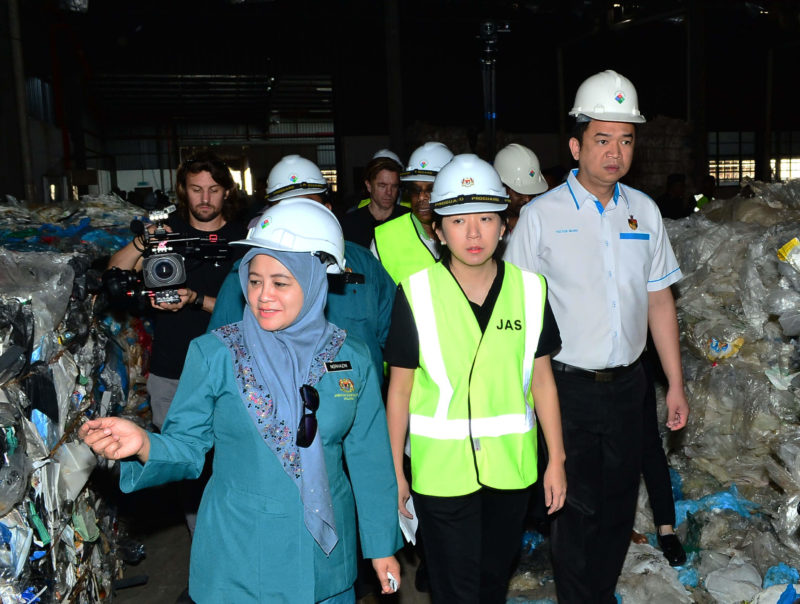Malaysian authorities are seeking to repatriate shipping containers full of mixed plastic waste described as ‘contaminated and low quality’, with some material believed to have originated in the UK.
The action comes as material from UK local authorities has been reported as being found on land in Malaysia by a BBC documentary crew as part of a forthcoming series on plastic waste. The findings were highlighted in the national press last weekend.

Malaysian Environment Minister Yeo Bee Yin (centre) examines plastics scrap on a site inspection in early 2019 (Picture: Mestecc)
Malaysian environment minister Yeo Bee Yin has said that the country is currently reviewing requirements and procedures relating to the imports of plastic waste, amid what it has described as imports of “mostly contaminated, low-quality, non-recyclable and difficult to dispose [sic] mixed plastic waste”.
The move follows the country’s bid to tighten controls on the import of plastic scrap last summer due to concerns over increasing shipments of the material into the country (see letsrecycle.com story).
Malaysia has become an increasing destination for UK material since China has tightened restrictions on material quality since 2017.
“If the importation of plastic wastes does not comply with the requirements under the convention the containers will be returned to the country of origin.”
Statement
Malaysian Government
A statement issued this month by the Malaysian government, in which it welcomed recent changes to the Basel Convention on plastic waste shipments, said that the country will continue enforcement activities on plastic wastes, in particular to repatriate non-compliant materials.
It said: “The Ministry through Department of Environment, which acts as the Competent Authority to Basel Convention, will continue with their enforcement activities on plastic waste containers or falsely declared cargo at all Malaysian entry points. If the importation of plastic wastes does not comply with the requirements under the convention the containers will be returned to the country of origin.”
BBC Documentary
The country was further in the spotlight this weekend due to footage released ahead of a forthcoming BBC documentary featuring the TV chef Hugh Fearnley-Whittingstall, titled ‘War On Plastic with Hugh And Anita’.
Legally, recyclable waste can be exported overseas if it is destined for recycling, but not to be sent to landfill or dumped.
Clips released ahead of episode one of the programme on 10 June show the presenter inspecting packaging waste dumped within Malaysia, some of which has been identified as having been from the UK. Councils mentioned by the TV documentary include Braintree district council in Essex and Rhondda Cynon Taf county borough council in Wales.
Responding to footage released from the documentary, a spokesperson for Braintree district council said that it had asked its contractor, Viridor, to investigate the incident. The item traced back to Braintree council was a single, used recycling bag, which may have been up to four years old, the council claimed.
A Braintree district council spokesperson said: “We’re aware that some of the council’s empty used recycling bags have been sent abroad in the past but they were processed through an Environment Agency-accredited and licensed processing facility. The material exported was to be processed as an “end-of-waste product”. This ensures there is no further onward trading as waste. The material is reprocessed into “pellet” or “flake” to be used as a raw material in the manufacture of new products.
“We’re currently unable to identify the source of the bag but any instances where material sent to an EA-accredited facility may not have been treated as end-of-waste will be investigated by our contractor Viridor.
“The contents of the bags (known as dry mixed recyclate) are sorted and re-processed within the United Kingdom.”
Rhondda Cynon Taf
Rhondda Cynon Taf said it was ‘concerned and disappointed’ that its material had been identified in the programme.
The council, whose plastic is traded by a Telford-based company, Lovell Recycling, said in a statement: “Despite the council utilising the correct contractual procedures, with accredited recycling processors, this unacceptable discovery has occurred. The council is as concerned and disappointed as residents will be by this discovery.
“Since being made aware of this matter, the council has conducted a full investigation with the accredited company concerned.
“On the basis of these investigations, we can confirm that only a small proportion, less than 3%, of Rhondda Cynon Taff waste was exported. We are therefore able to reassure residents that their positive recycling efforts are not in vain.
Recoup
Responding to the developments, Stuart Foster, chief executive of the plastics recycling body Recoup said he was ‘unsurprised’ by the news.
“We need better infrastructure to sort plastic to a minimum quality standard and reprocess more plastics in the UK, and an audit system which ensures plastics which are exported for recycling are prepared properly and sent to countries that have the infrastructure to handle it.”
Stuart Foster
Recoup
He said: “Without oversimplifying it, we need better infrastructure to sort plastic to a minimum quality standard and reprocess more plastics in the UK, and an audit system which ensures plastics which are exported for recycling are prepared properly and sent to countries that have the infrastructure to handle it.”
“There will have been a range of opportunities outlined in responses to the recent Defra consultations as part of the wider EPR review to help stimulate sustainable recycling markets. In addition, we are already seeing some additional investments in sorting and reprocessing capacity in the UK and Europe.”
The post Malaysia to repatriate ‘mixed plastic waste’ appeared first on letsrecycle.com.
Source: letsrecycle.com Plastic




